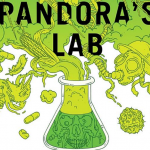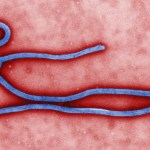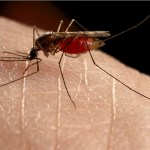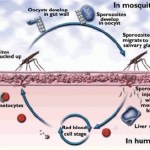malaria
What, with all the attacks on science and scientist these days, we may not want to be focusing on those times when science goes off the rails and makes a huge mess of things. But, science at its best and scientists at their best, will never shy away from such things.
Dr. Paul Offit just wrote a book called Pandora's Lab: Seven Stories of Science Gone Wrong, which not about an evil black dog that escaped from a box, but rather, seven instances when the march of scientific progress headed off a cliff rather than in the desired direction. People died. Many people died. Other bad things…
Mosquitoes. That's right, mosquitoes. As creepy little transmitters of diseases such as the current Zika virus epidemic (linked with causing the birth defect microencephaly), West Nile virus, malaria, chikungunya, and dengue fever, mosquitoes kill over 1 million people every year according to the World Health Organization.
This fascinating video from PBS shows how they suck your blood:
I am using insect repellent this summer after watching that video!
Earlier this week, the Nobel Prize in Physiology or Medicine was awarded to Youyou Tu for her discovery of the anti-malaria compound Artemisinin, as well as to William C. Campbell and Satoshi Ōmura for their discovery of a novel therapy for roundworm. Artemisinin, as some of you might know, is a compound derived from traditional Chinese medicine, which is why, to my irritation, it didn't take long for headlines like How traditional Chinese medicine finally won its Nobel Prize, What the 2015 Nobel Prizes mean for traditional Chinese medicine, and A Medical Breakthrough Made Possible By Ancient…
In the earlier days of the West African Ebola outbreak, it was not uncommon to hear people note that we should not panic about Ebola because, after all, far more people are killed from Malaria than Ebola. This is of course an irrelevant argument. That is like telling a person who has lost their family in a tragic airplane accident that it isn't so bad because, after all, far more people die in car crashes than aircraft crashes. For example, on August 5th, James Bell write in the Guardian, in a piece called Concerned about Ebola? You’re worrying about the wrong disease:
Since the Ebola…
It looks like a simple piece of paper and it’s nearly as cheap, ideally costing just pennies. But despite its small size, it’s poised to make an enormous impact and potentially save thousands of lives.
It’s a new test to spot counterfeit versions of the drug artesunate, which is one of the most important drugs used to treat malaria, a mosquito-borne disease that affects hundreds of millions of people every year. Based on the science of microfluidics, researchers at Oregon State University developed an easy-to-use and inexpensive testing kit that patients and health care providers can use to…
Holy crap! This is so clever!!
A synthetic sex ratio distortion system for the control of the human malaria mosquito
Component #1-- Anopheles gambiae, the kind of mosquito that is notorious for spreading malaria.
Component #2-- I-PpoI, a protein that 'sees' a specific DNA sequence, and cuts it. aka, a homing endonuclease. It was originally found in slime mold. :-D
It might seem as if there is no way these two components could come together in any meaningful way.
But when you are an evil scientist, anything is possible!!
It turns out that there is a DNA sequence on the X-…
"If you think you're too small to have an impact, try going to bed with a mosquito." -Anita Roddick
There's a lot to enjoy when it's warm and tropical, which it is many places this time of year. The flowers are out, the Sun often shines, and there's no shortage of spectacular music. Have a listen to to West Virginia-based band The Recipe, as they rock out (and give a shout-out to Neil Armstrong's moonwalk) in their great song,
Whiskey Pickle.
But there's an unwelcome visitor that comes along with this kind of weather: the mosquito.
Image credit: public domain image; source unknown.
Some…
Regular readers don't need to be told that I'm a bit obsessed with zoonotic disease. It's what I study, and it's a big part of what I teach. I run a Center devoted to the investigation of emerging diseases, and the vast majority of all emerging diseases are zoonotic. I have an ongoing series of posts collecting my writings on emerging diseases, and far too many papers in electronic or paper format in my office to count. Why the fascination? Zoonotic diseases have been responsible for many of mankind's great plagues--the Black Death, the 1918 "Spanish" flu pandemic, or more recently, HIV/AIDS…
The Evolutionary Consequences of Blood-Stage Vaccination on the Rodent Malaria Plasmodium chabaudi
The concept of vaccination is, superficially, simple-- Safely mimic 'infection' so your immune system learns how to fight a pathogen, without needing to get sick from the genuine pathogen. Then if you are ever exposed to the real, scary pathogen, your immune system already knows how to deal with it.
But things dont always go according to plan...
In 1966, a novel vaccine against Respiratory Syncytial Virus was a tragic failure. The lucky kids didnt respond at all. The unlucky…
On ERV, Abbie Smith writes “Malaria kills 1.24 million people a year. Mostly babies under 5 years old.” Malaria, although carried by mosquitoes, is caused by a single-celled protist which infects the liver and goes on to parasitize red blood cells. Now, a little genetic engineering could put a stop to this scourge. Smith says “Mosquitoes have a symbiotic relationship with their bacteria the same way we do—they need their ‘good’ bacteria to get all the nutrients they need to survive.” By tweaking the protein output of one such bacteria, scientists have made mosquito guts inhospitable to…
Life cycle of the malaria parasite. Image Source: Stanford University
Researchers, Jacobs-Lorena et al., at the Johns Hopkins Bloomberg School of Public Health have altered a harmless bacteria (Pantoea agglomerans) naturally found in the midgut of mosquitos to fight malaria by producing and releasing proteins that are toxic to malaria but harmless to mosquitos or humans. Since the gut is where the malaria parasite reproduces, this is the optimal location to put an end to it. The engineered bacteria were indeed successful at reducing the number of malaria oocysts by 98% in mosquitos with the…
Today is World Malaria Day, and the World Health Organization has launched a new initiative, dubbed T3: Test, Treat, Track. It urges countries where malaria is endemic to test every suspected malaria case, treat every confirmed case with anti-malarial medicine, and track the disease with "timely and accurate surveillance systems." The good news is that scaled-up malaria prevention and control efforts -- including delivery of 145 million insecticidal bed nets in 2010 alone -- have saved a million lives over the past decade. But, the WHO points out, there's still a long way to go in combating…
On The Pump Handle, Liz Borkowski examines the ethical dilemma of testing the anthrax vaccine in children. If a widespread attack were to occur, we would want to know the safety and efficacy of the vaccine beforehand. But is an attack likely enough to warrant testing the vaccine on children? On ERV, Abbie Smith explains how vaccines are made: "Sometimes we use dead viruses. Sometimes we use crippled viruses. Sometimes we dont need to use whole viruses at all—little chunks of the virus are fine. Sometimes we just need chunks of the virus, but we keep them dressed up in hollow membranes."…
Conceptually, vaccines are very simple things-- Dummy viruses/bacteria/pathogen that train your immune system how to fight the real viruses/bacteria/pathogen. All the benefits of being sick (training your B- and/or T-cells how to fight the pathogen) without actually having to get sick.
Nice.
In practice, however, things are infinitely more difficult. Sometimes we use dead viruses. Sometimes we use crippled viruses. Sometimes we dont need to use whole viruses at all-- little chunks of the virus are fine. Sometimes we just need chunks of the virus, but we keep them dressed up in hollow…
There are several reasons why there is no vaccine for malaria, but the thing you might want to know is that malaria is not a virus, and it is not even a bacterium. It's a protist. Generally speaking, there are not really vaccines for such organisms. One metastudy that looked specifically at Malaria had this to report:
We identify and evaluate 1916 immunization studies between 1965-February 2010, and exclude partially or nonprotective results to find 177 completely protective immunization experiments. Detailed reexamination reveals an unexpectedly mundane basis for selective vaccine…
As good news surfaces regarding a new (well, old) potential drug to help combat malaria--a drug already used to treat river blindness--KeithB and Phil Scheibel alerted me to another old malaria fighter featuring Dopey, Sneezy, and the whole gang:
Other Disney disease-fighting videos include Water, Friend or Enemy, Insects as Carriers of Disease and Hookworm. A list of other wartime shorts is here.
Malaria is one of mankind's most ancient scourges. A century after the discovery of its cause, various species of the parasite Plasmodium, humanity still remains in its deadly grip in many areas of the world. Malaria is estimated to have caused 225 million illnesses and almost 800,000 deaths in 2009, making it one of the top infectious disease killers. Many of these deaths occurred in children under the age of five.
Shah traces the history of malaria from the introduction of the parasite into the human population to modern-day controversies about malaria treatment, research, and funding. It'…
Andrew Bolt accepts the results of a study published in The Lancet that used random sampling to estimate deaths and came up with a figure of 200,000 per year, about ten times the number you get from a direct count. Actually, there are two studies that fit my description, one on deaths from malaria in India, and another on war-related deaths in Iraq and Bolt only accepts the one that suits his beliefs -- deaths from malaria, so he can falsely accuse Rachel Carson of causing them.
Now, the studies differed in several ways, so it's possible that someone could have good reasons to reject one and…
The anopheles mosquito, Anopheles gambiae, is the primary vector for human malaria. Mosquitoes in general, the A. gambiae included, find their prey by tracking body odor exuded from the breath and skin. Apparently, the composition of body odor determines A. gambiae's preference for one individual over another. It has been known for some time now that A. gambiae preferentially seek out and draw blood from pregnant women (Linsay et al 2000; Ansell et al 2002; Himeidan, Elbashir and Adam 2004), preferring pregnant over none pregnant women at about a 2:1 ratio.
Researchers working in Burkina…
Mark Pendergrast writes: To kick off this book club discussion of Inside the Outbreaks, I thought I would explain briefly how I came to write the book and then suggest some possible topics for discussion.
The origin of the book goes back to an email I got in 2004 from my old high school and college friend, Andy Vernon, who wrote that I should consider writing the history of the EIS. I emailed back to say that I was honored, but what was the EIS? I had never heard of it. I knew Andy worked on tuberculosis at the CDC, but I didn't know that he had been a state-based EIS officer from 1978…




